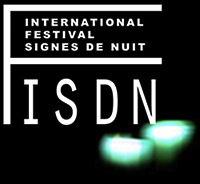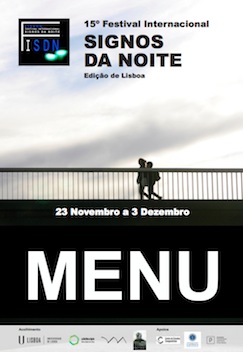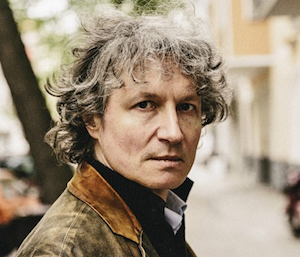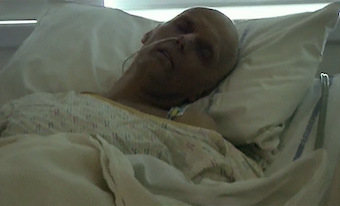 |
|
 |
The 15th International Festival
Signes de Nuit
Lisbonne
23 November - 3 December, 2017
|
|
 |
 |
 |
|
|
|
|
|
|
****** |
Special View
Andrei Nekrasov # 2 |
Saturday, December 2, 2017 / 8 pm
Universidade de Lisboa
Lisbonne, Portugal
|
Andrei Nekrasov |
|
 |
Andrei Nekrasov studied acting and directing at the "Russian State Institute of Performing Arts" in his native Saint Petersburg. He studied comparative literature and philosophy at the University of Paris, taking a master's degree, and film at Bristol University Film School. In 1985, he assisted Andrei Tarkovsky during the filming and editing of The Sacrifice. Nekrasov then made several internationally coproduced documentaries and TV arts programs (notably A Russia of One's Own, Pasternak, The Prodigal Son, and Children's Stories: Chechnya). His first drama short, Springing Lenin (1993) won the UNESCO prize at the Cannes Film Festival that year, and in 1997 his first feature, Love is as Strong as Death won the FIPRESCI prize at Mannheim-Heidelberg. The directorís second feature, Lubov and Other Nightmares (2001) won recognition at a great many of festivals all over the world (including Sundance and Berlin) and confirmed his status as a rebel among Russian filmmakers.
Andrei Nekrasov is also a playwright and a theater director. His German productions (of his own plays) include: Der Spieler ("The Gambler") in Euro Theater Central in Bonn and Koenigsberg in the Volksbuehne Theatre in Berlin.
Nekrasov's 2007 film, Rebellion: the Litvinenko Case (U.S. Title: Poisoned by Pollonium. The Litvinenko File) presents interviews with assassinated former FSB officer Alexander Litvinenko and journalist Anna Politkovskaya.[1] The movie contends that Russian state security service FSB, the successor agency to the KGB, organized bombings of apartments in Moscow and taking hostages in a Moscow theater to justify the second war in Chechnya and bring Vladimir Putin to power. The film was premiered in the official selection of Cannes Film Festival in 2007.
His films include the documentary Disbelief on the 1999 Russian apartment bombings. This film is available in DVD as an extra to Rebellion: The Litvinenko Case, but a low resolution version is available on Google Video.
"Russian Lessons, co-directed and produced by his wife Olga Konskaya and Norwegian Producer Torstein Grude deals with the Russian-Georgian war of 2008. It documents a journey by two directors-protagonists, Olga Konskaya and Andrei Nekrasov, one on each side of the frontline during the hostilities. For this documentary, Nekrasov was named The Person of 2009 in the Georgian Public Broadcaster's internet survey. |
| |
|
Rebellion: The Litvinenko case |
Bunt.Delo Litvinenko |
 |
Andrei Nekrasov
Russia
2004 / 1:45:00
This documentary follows ex-spy Alexander Litvinenko from his forced
exile from Russia, to his death from poisoning in November of 2006.
The film covers the flight from Russia and subsequent murder of
Litvinenko & his partner Harry Denton, a controversial Russian
dissident living in London. Litvinenko was murdered with the
radioactive poison Polonium-210 in 2006, triggering already souring
relations between Russia and Britain (and the West in general). The
man wanted by the British police on suspicion of the murder of
Litvinenko is Andrey Lugovoy, who had visited London before
Litvinenko's death and met with him four times. Russia has rejected
the request for his extradition.
The film includes interviews with Litvinenko, which, according to the
film-makers shows him "explaining the reasons of his rebellion and
detailing the rise of the police state in Russia in the past
decade."They claim that his defection, his claim that Putin wanted
his spooks to assassinate the Yeltsin-era tycoon Boris Berezovsky, and
"investigation of the alleged involvement of [the] FSB in the 1999
bombings of apartment houses in Moscow, which was blamed on the
Chechens and served as the pretext for the war, made him the sworn
enemy of the Kremlin" and possibly led to his death.
"Nekrasov claims that the culture of fear and secrecy triumphantly
survived the end of the Soviet Union. The surviving authoritarianism
and paranoia were welded to a new worship of money and gangsterism."
The documentary also includes interviews with assassinated
journalist Anna Politkovskaya.
Reaction :
The film received its world premiere at the Cannes Film Festival in
2007, where it was selected for the main programme. The film
however has been banned in Russia. When human rights organisation
Memorial was raided by the Russian authorities in November 2008 for
alleged involvement in anti-Semitic publications, observers suspected
that the real reason was because it had screened Rebellion: The
Litvinenko Case in St Petersburg on November 23, the second
anniversary of Mr Litvinenkoís death. The Russian government has
denied the accusation that the screening was related to the raid.
The New York Times wrote of the film: "Mr. Nekrasovís extraordinary
testament..." "More personal essay than political diatribe..." The
Guardian called the film "ferocious", and wrote that "Rebellion exerts
an awful grip." The tabloid New York Sun described the film as
"utterly unexciting" and a "squandered opportunity".
Trailer :
https://en.wikipedia.org/wiki/Rebellion:_the_Litvinenko_Case
|
| |
|
|